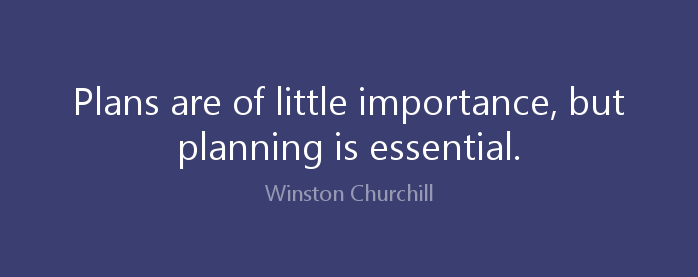
“Plans are of little importance, but planning is essential.” –Winston Churchill
Companies have been creating strategic plans forever. We are all familiar with the process: gather senior leaders in a room for several days or months (maybe with a consultant to facilitate), do a SWOT analysis, project numbers and aspirations, do some strong wordsmithing, dust it up, hand it out, disseminate it to the stakeholders, and check the box: The Plan is done and the future is in our grasp. We’re in control. Now let’s get back to the business of running the company.
In the last decade or so, there has been a backlash on strategic planning. With the knowledge that fewer than 10% of strategic plans are executed successfully, many organizations have abandoned the planning process in favor of “responding-to-opportunities.” For those of us in the non-profit world, that can mean anything from revising direction in favor of meeting criteria for a grant to reacting to a shift in the marketplace to a chance (or intentional) meeting with a potential partner. All of these opportunities can be fruitful, but chances are good they didn’t show up in the strategic plan created a couple of years ago—or even months ago…
On the other hand, if we leaders—in any arena—rely solely on responding-to-opportunities as a strategy, we find ourselves wandering all over the landscape without a compass to guide us. Without some sort of framework, we are relegated to putting out fires and simply reacting to what comes up.
Strategic planning at its worst appeals to a leader’s need for control. It reflects an aversion to risk. It diminishes creativity and innovation. And it rules out the possibility of quantum leaps. Strict planning causes organizational arthritis. Without flexibility, the slightest turbulence turns into a crisis.
Henry Mintzberg, in his seminal work, The Rise and Fall of Strategic Planning, differentiates the concepts of strategic planning and strategic thinking. Strategy, he says, isn’t a plan but it is a “pattern that blends intended response with response that emerges out of the changing environment.” Planning is essential, as Winston Churchill told us. Mintzberg would tell us that “planning is essential … to ensure that the future is taken into account including preparing for the inevitable, preempting the undesirable, and controlling the controllable.”
I believe planning is essential. And I agree with Mintzberg in that planning is not a thing, but a way of thinking—it is the “brain” of an organization. It fueled by superior critical thinking skills, powerful judgment, ongoing environmental analysis, and brave, timely decision making.
Those of us in the nonprofit business are here to create change. We are here to offer precise solutions to complex societal problems. Rather than creating a plan that rusts on the shelf, let’s create a workforce that embodies the attributes of strategic thinking—nimble, strong, brave, and willing to take smart calculated risk for the sake of success. And yes, let’s make sure we have some sort of road map to help guide us to the future with the ongoing opportunity to pursue new highways along the way.
What do you think?